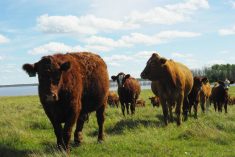Ryding-Regency Meat Packers buys feeder cattle and calves from Western Canada, which could affect Sask. and Man.
The Dec. 2. cancellation of federal slaughter, processing and export licences at Toronto-based Ryding-Regency Meat Packers and its affiliates has sent ripples through the Canadian beef industry.
The move leaves Ontario cattle producers scrambling to find processing space for fat cattle. Export options to the United States are limited and sending the cattle to federal slaughter plants in the West involves expensive transportation bills.
The Canadian Food Inspection Agency revoked Ryding-Regency’s licence last week but the beef and veal processor had been under suspension since Sept. 17 because of a food safety investigation that caused numerous food recalls on suspicion of E. coli contamination.
Read Also

Farming Smarter receives financial boost from Alberta government for potato research
Farming Smarter near Lethbridge got a boost to its research equipment, thanks to the Alberta government’s increase in funding for research associations.
The CFIA said in a news release that the licence was cancelled “because of the opinion that a risk of injury to human health may result if the licence holder continues to conduct an activity that is identified in their licence.”
It further stated the company had violated a section of the Safe Food for Canadians Act that prohibits the making of false or misleading statements or information to CFIA investigators.
Ryding-Regency was one of only three federally inspected processing plants in Ontario. St. Helens Meat Packers is in Toronto and Cargill has a plant in Guelph. The latter operation has added a shift to help accommodate the backlog but there’s still pressure on the industry.
The now-closed plant processed about 2,000 head a week, 10 to 15 percent of Ontario’s beef slaughter.
Brian Perillat, manager and senior analyst at Canfax, said the Ontario market has been stagnant despite a good rally in fed cattle prices elsewhere in North America.
“Feedlots there have probably been losing money the last few months and this doesn’t help,” said Perillat.
Nevertheless, existing plants are running at or near capacity.
“One of the bigger issues here in North America is slaughter capacity is so tight as it was. We’ve expanded our cattle numbers significantly across North America, though not really in Canada. But there isn’t really any excess room for slaughter capacity.”
Though shipping cattle west is an option for Ontario producers, freight costs could negate any benefit. Markets in the United States also have limitations, said Perillat.
A plant in Moyer, Pennsylvania, for example, will not accept cattle heavier than 1,600 pounds and some of the Ontario cattle exceed that.
The U.S. beef processing picture was already disrupted earlier this year when a fire stopped operations at the Tyson plant in Holcomb, Kansas, in August. That plant processed about 6,000 head per day and forced major cattle shuffling and kill capacity issues in the sector.
The Ryding-Regency closure could affect markets across Canada to some degree, said Perillat, because Ontario buys feeders.
“They buy a lot of feeder cattle and calves out of Western Canada and they’ve backed off of that market too, especially in places like Manitoba and Saskatchewan. The Ontario buyers certainly do add to the market there. We’ve seen them back off and maybe a little bit softer feeder cattle prices in Western Canada too because of that.”
Ryding-Regency’s affiliates, which also had their CFIA licences revoked, include Canadian Select Meats and the Beef Boutique. Both operate under the St. Ann’s Foods banner.
Meat recalls that began this fall eventually encompassed more than 890 products from the plants, which had been distributed in hotels, restaurants, institutions and through retail.


















